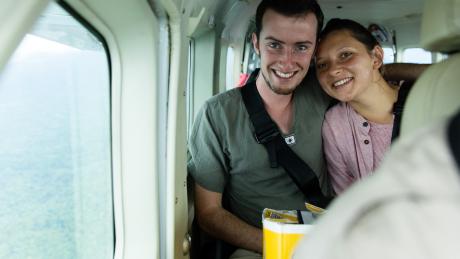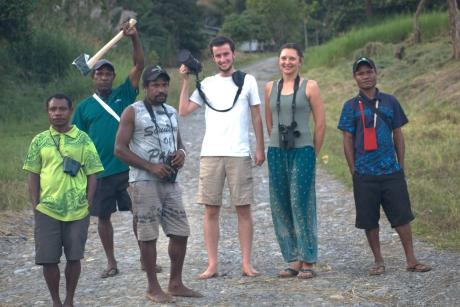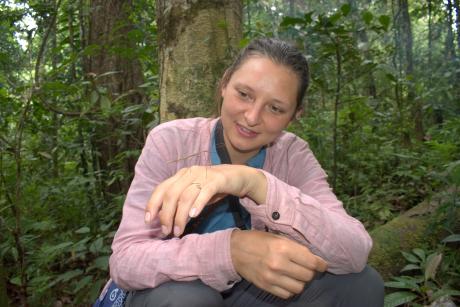
MAF flight took two European city dwellers to Lumi to trade concrete urban centres for trees and wildlife.
Looking for a small conservation project in a remote area, the Tenkile Conservation Alliance (TCA) based at Lumi, Sandaun Province, seemed to be the perfect fit for two young European academics.
Earlier this year, MAF flew German conservationist Elisabeth Hein and the British solicitor James Wareing from Wewak to Lumi with a landing at Sibilanga on the way.
Many told us that to have MAF is a big treasure. It gives a connection to a hospital, in case of emergency.
Elisabeth originates from Bremen, a city in North Germany with a population of 570.000. To compare, Port Moresby had about 360,000 inhabitants in the 2011 census.
James is a solicitor from London. The British capital’s population is estimated to be more than nine million. This is more than what Papua New Guinea’s population was accounted for in the 2011 census.
James, who volunteers as the Finance Manager of TCA ,explains what prompted the two European city dwellers to trade life in the big city for a remote rainforest village in PNG.
“For one thing, it was a change of purpose. The environmental cause is something we both feel very passionately about. It's very frustrating living in a big city dominated by commercial interests and not feeling that connection to the work you're doing. We’re motivated by the work and the change of lifestyle, to change concrete for trees and wildlife.”
As the two were searching the internet for a small project in a remote area, the TCA base at Lumi seemed to be the perfect fit, as Elisabeth explains.
“It was a coincidence that we came across the great work from Jim and Jean Thomas and what they had done over the past 20 years. It sounded wonderful and really exciting.”

“TCA started originally to protect two critically endangered species of tree kangaroos. Their numbers were both as low as about 100 in the wild,“ explains James. “Through a hunting moratorium and community engagement, those numbers are fortunately around 300 for both species. Now, TCA has evolved to have a more inclusive goal of bringing the benefits of conservation to the local people, rewarding them for setting aside their land and for signing up to this project with benefits such as solar power, clean water and education programs to reflect the fact that these people have made the choice of choosing conservation over potentially giving their land away to logging and showing that there is a benefit to be had from conservation.”
For James and Elisabeth MAF flights provide new and ensuring perspectives.
“It was very impressive to see the world from above,” said James. “And it is good to know that we are safe and have an easy way out.”
“We are very grateful for having this connection,” adds Elisabeth. “It (MAF) enables us to get the supplies we need.”
“From what we’ve heard, the locals seem very proud when a plane lands. The whole village is on its feet, and everyone watches. It's a huge event every time. Many told us that to have MAF is a big treasure. It gives a connection to a hospital, in case of emergency. Otherwise, it would not be so possible as transport by road is simply not safe, and it takes far too long in an emergency.
Story Mandy Glass
